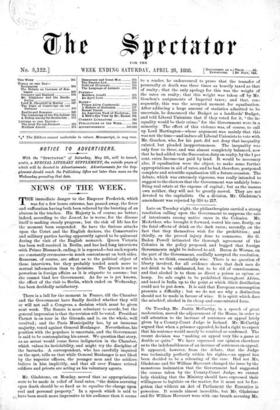Mr. Gladstone, on Monday, moved that as appropriations were to
be made in relief of local rates, "the duties accruing upon death should be no fixed as to equalise the charge upon real and personal property." In a speech which is said to have been much more impressive to his audience than it seems
to a reader, he endeavoured to prove that the transfer of personalty at death was three times as heavily taxed as that of realty; that the only apology for this was the weight of the rates on realty; that this weight was taken off by Mr. Groschen's assignments of Imperial taxes ; and that, con- sequently, this was the accepted moment for equalisation. After adducing a large amount of statistics admitted to be uncertain, he denounced the Budget as a landlords' Budget, and told Liberal Unionists that if they voted for it, "the in- equality would be their crime," for the Government were in a minority. The effect of this violence was, of course, to call up Lord Hartington—whose argument was mainly that this was not the time—and induce all Liberal Unionists to vote with Mr. Goschen, who, for his part, did not deny that inequality existed, but pleaded inopportuneness. The inequality was only four to three, and was almost completely balanced, now that he had added to the Succession-duty on realty, by the 1 per cent. extra Income-tax paid by land. It would be necessary also, if equalisation were the object, to make some further appropriations in aid of rates, and he had, therefore, postponed complete and scientific equalisation till a future occasion. The debate, which was extremely vigorous, was really intended to suggest to the electors that the Government was unfairly bane. fiting real estate at the expense of capital ; but as the masses own neither, they will not be greatly moved. They are not devoted to the capitalists. On a division, My. Gladstone's amendment was rejected by 310 to 217,


































